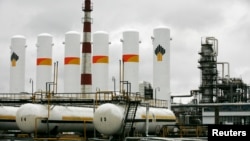The European Union and the United States have imposed new packages of economic sanctions against Russia for its actions in Ukraine.
The new EU sanctions that went into effect Friday target firms in Russia's energy sector, including Rosneft, Russia's largest oil company, Gazprom Neft, the oil unit of Russia's giant natural gas monopoly Gazprom, and Transneft, Russia's pipeline operator, and three large defense firms, preventing the companies from raising money in the EU market.
They also target individuals, including leaders of Ukraine's pro-Russian separatists and leading Russian businessmen and politicians, including Sergei Chemezov, a close associate of Russian President Vladimir Putin who heads the arms and technology holding Rostec, and veteran ultra-nationalist politician Vladimir Zhirinovsky.
Russia's reaction
Hours after the penalties took effect Friday, Moscow vowed to retaliate. The Russian Foreign Ministry called the new U.S. measures a "hostile step in line with the confrontational course taken by the U.S. administration."
The new sanctions close down Western aid to Russia's burgeoning deepwater Arctic offshore and shale oil exploration. They also target five defense companies, and the arms and technology company Rostec, as well as several leading banks, including Russia's largest, Sberbank.
Senior Obama administration officials stressed that the United States can and will roll back the new penalties, if Moscow and the Pro-Russian separatists Russia is accused of supporting fully implement a cease-fire deal reached earlier this month.
The United States and Europe say Russia's role in the conflict in Ukraine is the principal reason for the sanctions.
A summit of EU leaders last week agreed to new sanctions, but postponed their implementation to see whether a cease-fire reached last Friday between Ukrainian government forces and pro-Russian separatists would hold.
Second aid convoy
In other developments, Russia's Ria Novosti news agency, reported early Saturday that the first trucks in a second Russian humanitarian aid convoy had crossed into Ukraine territory, heading for the city of Luhansk. The report was not immediately confirmed, but Russia's Emergencies Ministry earlier said the humanitarian cargo included food, generators and water purifiers.
A huge Russian convoy entered Ukrainian territory August 22, carrying food and medical items to the largely ethnic Russian population increasingly cut off from critical supplies during the five month separatist uprising.
European Council
European Council President Herman Van Rompuy has said the sanctions may be amended, suspended or repealed after the EU reviews the state of the cease-fire at the end of September.
At a news conference Friday in Kyiv together with Ukrainian President Petro Poroshenko, the European Commission's outgoing president, Jose Manuel Barroso, emphasized hopes for a peaceful outcome in Ukraine:
"We have made it clear that those restrictive measures are not an end in themselves," said Barroso.
"There is not an intention of aggravating the situation," he continued. "The intention is to show clearly there are some kinds of decisions that we cannot accept. And there will be irreversible damage in relations between Russia and the European Union if the issue of Ukraine is not solved according to international principles, including the respect for the sovereignty of Ukraine."
Moscow already has annexed Crimea and Ukraine and the West have accused Russia of providing the rebels with weapons and recruits, and more recently, of sending Russian troops into eastern Ukraine, charges Moscow has repeatedly denied.
Question of EU sanctions
Some experts say the sanctions already imposed on Moscow are hurting Russia's economy, but don't go far enough. But analyst Paul Ivan of the European Policy Centre in Brussels says the Europeans are reluctant to impose measures that may harm their own fragile economies:
"I don't see that happening because it would involve costs for the West as well, especially for Europe," he said. "[Those are] Costs which European leaders are not willing to take, at least not at this moment. There's constant hope that the conflict in Ukraine will not degenerate even more."
Putin's spin
Russian President Vladimir Putin on Friday called the EU sanctions "strange," saying they undermine the "peace process" in eastern Ukraine, and said his government would consider "retaliatory measures." But he added that any such response would be aimed at creating the best possible conditions for Russian producers.
Foreign Minister Sergei Lavrov, who echoed Putin's concerns, indicated that the Kremlin will respond.
The military conflict between the Ukrainian government and pro-Russian separatists in eastern Ukraine has been raging since mid-April, claiming thousands of lives.
Ukraine situation
Ukrainian President Petro Poroshenko said Wednesday that 70 percent of the Russian troops in Ukraine had crossed back into Russia, but NATO said on Thursday that about 1,000 Russian troops remained inside Ukraine along with "substantial amounts of military equipment."
On Friday, Poroshenko told a conference in Kyiv that the EU sanctions show "how close Ukraine is for every leader, every European country." He also said there no "military solution" to the conflict in eastern Ukraine and that he hoped the peace process launched last week would continue.
Meanwhile, Ukraine's government and pro-Russian rebels have exchanged prisoners near the separatist stronghold of Donetsk under the watch of international observers, under the terms of last week's cease-fire deal.
Officials say each side released about three dozen prisoners.









